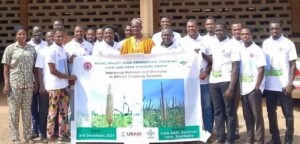
Selected seed companies and young potential seed producers have undergone training on the production of improved pearl millet seed as part of efforts to make the seeds available to farmers.
The participants, drawn from IWAD and ANTIKA seed companies and some national service personnel, were educated on both open pollinated variety and hybrid seed production of pearl millet, pest and diseases affecting pearl millet, certification of pearl millet amongst others.
The day’s training was organised by the Council for Scientific and Industrial Research-Savanna Agricultural Research Institute (CSIR-SARI) in collaboration with the Seed Systems Group, an international seed company.
It formed part of the Vision for Adapted Crops and Soils project being implemented by the CSIR-SARI in partnership with the Ministry of Food and Agriculture, IWAD, and ANTIKA, both private seed companies, and funded by the United States Agency for International Development through the Seed Systems Group.
The project, which is being implemented in the North East, Upper East and Upper West Regions, seeks to reach out to about 50,000 farmers with improved pearl millet seed for enhanced livelihood and food security in the country.
The improved pearl millet is a warm season crop, which matures between 65 – 80 days; significantly faster than the traditional late millet, which typically takes up to 120 days to mature.
The improved pearl millet withstands drought and pest infestations, which have been one of the major challenges for millet farmers in the country.
Dr Issah Sugri, Principal Research Scientist, Post Harvest Specialist and Deputy Director, CSIR-SARI, speaking during the training at Nyankpala near Tamale, said it was to provide knowledge and build the capacity of seed producers on some of the common pests and diseases of pearl millet to ensure high yields.
Dr Sugri said the training was also to equip participants with effective management strategies as well as enable them to adopt the best practices for seed production.
He urged them to take advantage of the training to help make the variety attractive to farmers.
Dr Peter Anabire Asungre, a Pearl Millet Breeder at CSIR-SARI Manga Station in the Upper East Region, told participants that maintaining the quality and integrity of pearl millet seed required meticulous attention to details and adherence to best practices in seed production.
He urged seed producers to adhere to the rigorous standards to ensure the availability of high quality pearl millet seeds for farmers to ultimately support sustainable agricultural practices, food, and nutrition security.
He encouraged farmers to embrace the cultivation of the improved pearl millet varieties to boost production.
He advised commercial pearl millet farmers to prioritise mono and relay cropping systems to ensure maximum yields.
Dr Emmanuel Amponsah Adjei, Country Coordinator, Seed Systems Group, explained that the project was to ensure that more farmers had access to the improved pearl millet seed to encourage its production.
He said “We realised that pearl millet has not been given the needed support leading to instances where farmers still resort to the use of own-saved seeds, which do not give appreciable yields. So, we are undertaking this initiative to create more awareness on the improved varieties.”
Mr Ishmael Sedo, a representative of IWAD, described the training as informative, saying it would further strengthen IWAD’s resolve to produce more certified seeds of pearl millet for uptake amongst farmers because of its numerous benefits.
Source: GNA



